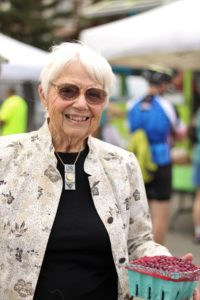This year has introduced a lot of new concerns about how we work, shop, and socialize. Farmers’ markets have adopted new protocols to keep shoppers and vendors safe this year.
Maine boasts more than 110 summer farmers’ markets, and more than 30% of those continue year ‘round. Each Maine farmers’ market is unique. Most communities have at least one farmers’ market within easy driving distance. Visiting a farmers’ market in a new community can be an excellent way not only to pick up some great food, but also to meet farmers and food producers, learn about the neighborhood, enjoy a social environment, and maybe enjoy some music and pick up some new cooking tips. (Find farmers’ markets by day of the week on the Maine Federation of Farmers’ Markets website.)
Whether you’re a farmers’ market fan who visits them wherever you go, or if you’re a Mainer looking to diversify your shopping locales a bit, there are some special features of Maine’s markets you should know.
- The majority of Maine farmers’ markets are managed and operated collectively by the farmers themselves. It’s not uncommon for older markets, like the Brunswick Farmers’ Market, to have farms that have been members for generations.
- A “farmers’ market” is a particular group of farmers and producers, it is not necessarily a particular place. The Orono Farmers’ Market, for example, takes place at several different locations around the town of Orono depending on the day and season.
- The average size of a Maine farmers’ market is about 15 members, but there are many 40+ markets, such as the Brunswick-Topsham Landtrust Farmers’ Market.
- Every Maine farmers’ market is unique, because each is organized locally. (Local producers and shoppers have different needs and expectations, and municipalities have different rules.) Many markets strictly offer agricultural products (things like food, yarn, soaps, and candles). Others offer locally crafted art and gift items, like the Stonington Farmers’ Market, which incorporates crafters.
- The State of Maine regulates the use of the term “farmers’ market.” According to state law, farmers’ can only sell products they have grown or produced, supplemented minimally (up to 20%) from another Maine farm. Anything from another farm must be clearly labeled. When you shop at a farmers’ market, you are buying straight from the farm that grew or produced the item!
- The oldest farmers’ market in Maine is the Portland Farmers’ Market, founded in the 18th century and operated in downtown Portland (and now at Deering Oaks Park on Saturdays in summer) for centuries. The Wednesday market at Monument Square is Maine’s most “urban” market experience.
- Maine’s farms tend to be very diverse, which means they grow and make a variety of products. Therefore, even if a market has relatively few members, you might be surprised by the number of products available!
- The farmers and other producers who sell items at Maine farmers’ markets are often called “members.” Because most markets are cooperatively run by the farmers, they refer to themselves as “members,” and will say things like, “I’m a member of the Rockland Farmers’ Market.” That means they have a booth at that market.
- The planning for summer markets is done during the winter, including accepting applications for new members. Most have a limited amount of spaces available, so when a space opens up, the competition can be fierce! New members that you see this season were likely anxiously applying and interviewing for their spot at the market last January or February.
- Most Maine farmers’ markets use pop-up tents to provide shade and shelter. Each farm brings their own tent every week. A few markets, such as the Augusta Farmers’ Market at Mill Park and the Presque Isle Farmers’ Market, have permanent structures for their summer markets. Whatever the arrangement, you can expect quite a change of pace when you shop outdoors!
- Each market is locally operated, and might change hours and location due to events or circumstances in the community. (For example, the Machias Valley Farmers’ Market adjusts its hours for the Blueberry Festival.) Always check local listings, particularly Facebook, to verify market hours and location.

